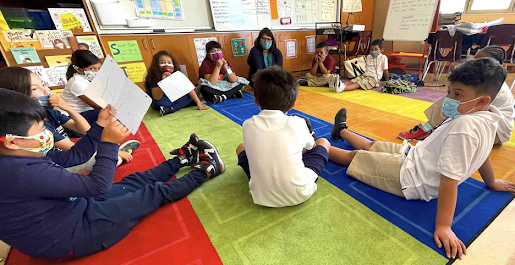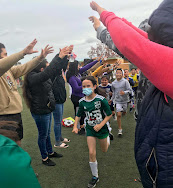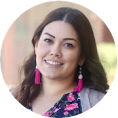 |
| Source: Oakland Leaf |
For several years there has been an on-going decline in the funding for arts education in schools which we have been discussing as a major problem. (See previous LIAS blogs on art here.)
Afterschool programs are perfectly positioned to fill this gap. Below, we offer 2 guest blogs from Oakland Leaf on the importance of creativity and arts education.
Oakland Leaf Afterschool Program Manager on The Power of Creative Arts Education
By Guest Blogger, Jonathan Higgenbotham, Bret Harte Middle School Afterschool Program Manager. (This blog was originally published on Oakland Leaf.)
Middle school can be tough on self-esteem. Social comparison becomes more intense and can lead to feelings of unworthiness that affect everything from healthy decision-making to academic performance. When I was in middle school, participation in team sports boosted my confidence and kept me on a positive path. As the manager of an afterschool program with a strong emphasis on the visual arts, I have had the opportunity to observe how creative pursuits can have a similar transformative impact on a young person’s life.
 |
| Source: Oakland Leaf |
At the beginning of the school year, after more than a year of remote learning, most of our afterschool program students experienced some degree of social anxiety or awkwardness. A handful of students, however, suffered much more intensely than others. I remember one of our students, an only child who had virtually no contact with other kids while school campuses were closed, was extremely insecure and struggled to communicate or even make eye contact with his peers.
He flourished in our visual arts classes though and, quickly, everything began to change for him. The vivid imagination and endless ideas that he had been unable to share in words began to fly out of him onto the paper, canvas, and screen. He started to get tons of positive feedback from his classmates. He developed friendships with other students with a passion for anime and comic books, across surprisingly diverse peer groups, and he no longer spent lunch and recess during the school day alone.
Of course, engagement with the arts isn’t some kind of magic fix for every kid’s experience of marginalization. But I have seen with my own eyes, time and time again, how participation in the arts has connected the most unlikely kids. And how it has inspired them to be more expressive and authentic in other areas of their lives…more willing to step outside of their comfort zones and try new and hard things.
I think this is especially the case in creative youth development programs like Oakland Leaf’s, where all activities have an integrated social and emotional learning component that promotes creative risk-taking, peer appreciation, and bridge-building across differences. And where all of our educators, including our art teachers, are trained in multicultural education, trauma-informed practices, and restorative justice.
Cultivating Creative Spaces: A week in the life of Oakland Leaf afterschool programs
by Guest Blogger, Isa Gonzalez, Director of Community Programs (This blog was originally published on Oakland Leaf.)
“Oakland Leaf has emphasized creative expression since our founding project, a citywide youth talent show. An abundance of research confirms what we have seen again and again in our work with youth: arts education strengthens young peoples’ academic, problem-solving, and social skills, and boosts confidence and motivation. And equally important, by cultivating creatives spaces, we are cultivating joyful spaces where young people feel empowered to be their full authentic selves.” - Oakland Leaf blog
I started my work with Oakland Leaf as an intern in a media arts program called Youth Roots when I was just 13 years old. After I graduated from college, I returned to Oakland Leaf as an After-school Program Instructor and then, later, I was promoted first to Program Manager and then, earlier this year, to Director of Community Programs. I’ve had very different responsibilities in each of these roles, but my underlying goal has always been the same: to cultivate safe spaces for youth to be their full authentic selves.
 |
| Source: Oakland Leaf |
I have found creative expression to be one of the most powerful tools for fostering authenticity. Talking about personal feelings can make people feel vulnerable, and children especially don’t often have the language to describe what they are going through. And it is not uncommon for young people to be closed off, especially if they feel judged or marginalized by their family or peers.
Nonverbal tools, and especially art activities, help kids identify and express their emotions, and share their authentic selves. Studies show that artistic expression can decrease feelings of anger and depression and can help students regulate their emotions. Creative expression is embedded into both our social and emotional learning and our restorative justice programming.
For example, as part of our conflict resolution work, before facilitating a conversation, we have the students fill out a reflection form sharing their version of events, how things could have gone differently, what harm was done, and how it might be repaired. Students have the option to share their thoughts as words or as drawings. The experience of writing, for many kids, is automatically associated with academics and this stifles their expression. Drawing, on the other hand, is associated with play and this supports many students to open up in a way they wouldn’t otherwise. Similarly, during our mindfulness sessions, we give students the option of coloring or drawing, rather than just sitting or lying still.
 |
| Source: Oakland Leaf |
When students have positive experiences with the creative processes and tools we expose them to, they adopt them as life-long practices that they can turn to for self-expression, self-regulation, and self-understanding long after they age out of our programs. The skills, knowledge, and sense of purpose and connection that I acquired as an Oakland Leaf youth program participant continue to serve me to this day.
MORE ABOUT…
Jonathan Higgenbotham is Bret Harte’s Afterschool Program Manager and was born and raised in Oakland. He attended Pine Manor College and entered into the field of education. He is a former Science and PE teacher and greatly enjoys building upon the curiosity and intelligence of young minds. He is also a high school basketball coach and has worked and volunteered with the Black Cowboy Association for about 5 years. He strives to embrace and empower young generations to be the greatest they can be. He is a huge proponent in leading by example as well incorporating as much fun and joy into the work on the daily.Isa Gonzalez is Oakland Leaf’s Director of Community Programs. Before transitioning into her current role, Isa served as the Program Manager at one of Oakland Leaf’s afterschool programs. As a minority in Oakland, she has been labeled as a female who is statistically designed to fail, and lives in a city labeled as a “malignant place.” But Isa refused to let others define her, and always was eager to realize her dreams. Isa discovered her passion for equity in education and Feminism through an Oakland Leaf critical media afterschool program. Isa is a life-long learner and is passionate about sharing her knowledge with those who surround her. At Oakland Leaf, Isa continues her mission of providing youth with the resources that they might not be able to attain elsewhere, and gives them the tools to be active agents of change in our communities.Oakland Leaf was founded in 2001 by a collective of East Oakland educators intent on empowering youth voice. At the time, Oakland was experiencing a surge in crime and violence, the country was about to enter a war, and many kids in Oakland didn’t have an outlet or a platform to examine and express their fears, anxieties, hopes and dreams. Oakland Leaf’s first program was the All Oakland Youth Talent Show. More than two decades later, they have evolved into a highly regarded leader in the fields of youth development and out-of-school time learning.















